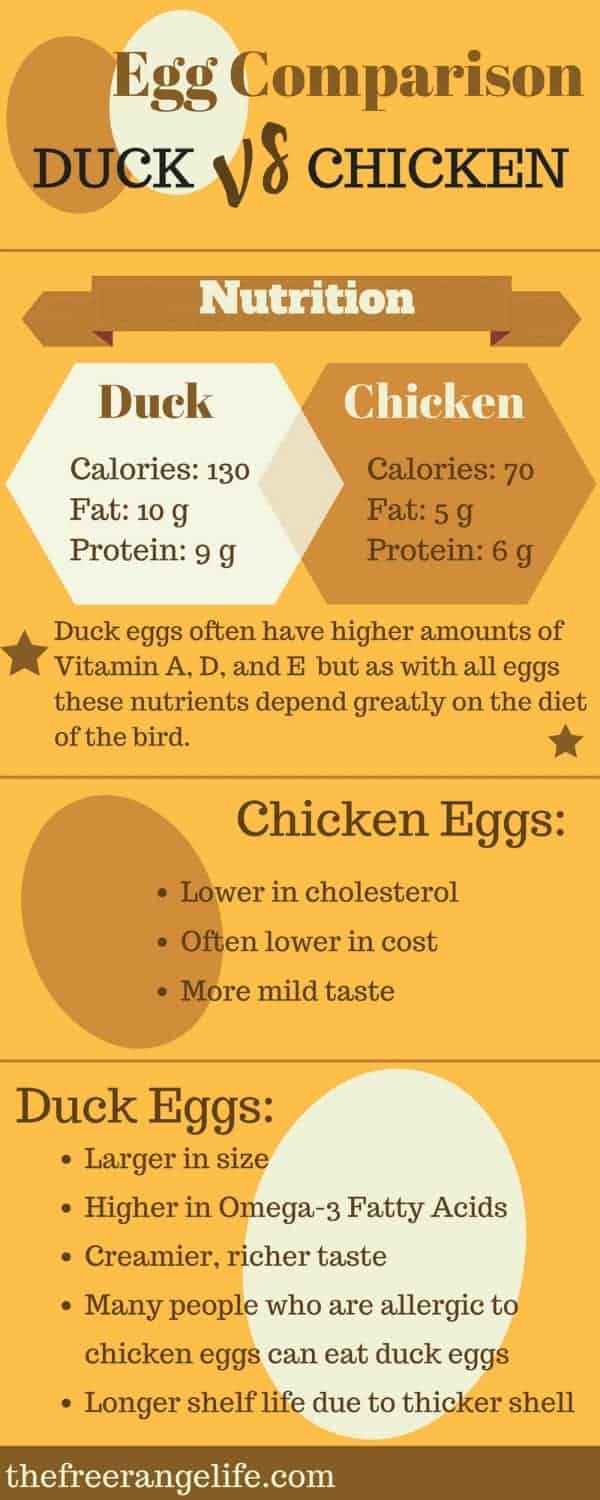
They provide a complete range of amino acids and are considered a complete protein Because duck eggs generally have a thicker shell they will stay fresher longer. Consider the fact that an egg contains everything that a chicken embryo needs in order to develop into a chick and you can imagine that this breakfast staple is nutrient dense in a major way.

Generally a chicken egg has about 628 grams of protein while a duck egg has about 897 grams.
Chicken egg vs duck egg protein. Yet chicken egg whites tend to contain greater amounts of some proteins like ovalbumin conalbumin and lysozyme than duck egg whites. Scientists believe these proteins and others in eggs have. On the other hand a duck egg contains 71 milligrams of omega-3 fatty acids compared with 37 for a chicken egg.
In terms of calories a duck egg contains 130 calories compared with 80 for an extra-large chicken egg and 9 grams of protein compared with 7 grams for a chicken egg. Protein The protein content is slightly higher in the duck eggs compared to chicken eggs. 100 grams of duck eggs have about 131 gm of protein compared to 128 gm in chicken eggs.
The amino acid content profile is similar but duck eggs contain more of each of them. But the scrambled duck eggs also had a dense resilient texture that some tasters objected to. Thats because the duck egg whites contain more of the structure-building protein albumen than the whites of chicken eggs do.
Because of this difference in composition we dont recommend swapping duck eggs for chicken eggs in recipes. Partially due to size the duck egg is higher in fat and cholesterol but it is also higher in protein and omega-3 fatty acids. Ounce for ounce duck eggs are more nutrient dense.
They have more Vitamin A Vitamin D folate Vitamin B6 Vitamin B12 and iron than chicken eggs. Duck eggs are richer with more albumen which makes cakes and other pastries fluffier. Duck eggs have more Omega-3 fatty acids.
People who cannot eat chicken eggs due to allergies can often eat duck eggs. Duck eggs are just as safe to eat as chicken eggs. The USDA has the exact same standards and regulations in place for duck eggs as it does for.
Eggs are seriously high in nutrients. Consider the fact that an egg contains everything that a chicken embryo needs in order to develop into a chick and you can imagine that this breakfast staple is nutrient dense in a major way. In fact a single large egg contains around.
An average quail eggs give you about 117 grams of protein whereas you can get over 6 grams of protein easily from a large chicken egg. Also eating adequate protein has positive effects on muscle and strength during resistance training has a potential impact on lowering blood pressure as well as optimizing bone health. As we mentioned above duck eggs are quite a bit larger than chicken eggs meaning they contain more calories.
But thats not the only metric worth looking at. Gram for gram duck eggs are higher in Omega-3 fatty acids protein and fat. If getting yolked is an objective of yours consider the mighty duck egg as your post workout meal.
A duck egg is slightly more nutritious than a chicken egg partly due to its size. An average duck egg weighs about 25 ounces 70 grams whereas a. Generally a chicken egg has about 628 grams of protein while a duck egg has about 897 grams.
More protein means that you stay fuller for longer periods. If youre on a high-protein diet this is excellent news for you. Cholesterol Level of Duck Eggs.
Both types of eggs match each other in terms of carbohydrate content while the protein content is slightly higher in the duck eggs compared to chicken eggs. The mineral content of duck eggs is very similar. Both contain selenium manganese zinc copper potassium sodium phosphorus calcium and.
Protein patterns in different states. The egg yolk protein profile compared to other poultry species remains unknown. As three most consumed avian eggs all over the world chicken quail and duck eggs might have different egg protein patterns due to the.
Both duck and chicken eggs provide protein with high biological value HBV. They provide a complete range of amino acids and are considered a complete protein Because duck eggs generally have a thicker shell they will stay fresher longer. People who cannot eat chicken eggs due to allergies can often eat duck eggs.
However taking size into account duck eggs have many of the same vitamins and minerals as chicken eggs but in slightly higher amounts. There are some exceptions to this though. For example there is twice the amount of iron in duck vs.
Duck eggs also have more omega-3 fatty acids while chicken eggs have more omega-6 fatty acids.